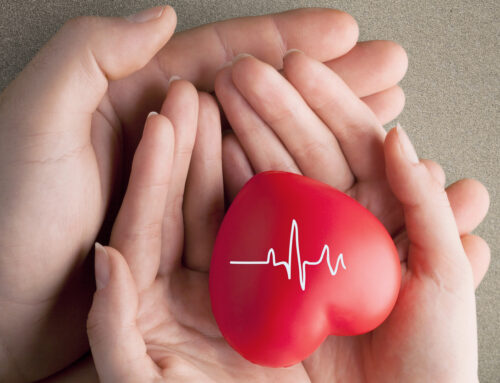February is Heart Health Month, and there’s no better time to ensure that you know the facts about how to keep your heart healthy. For example, did you know that for every five-point increase in BMI (body mass index), the risk of heart failure rises by 32 percent? Excess weight is associated with high blood pressure and diabetes. However, a recent study by John Hopkins showed that being overweight puts you at risk for heart disease even if you seem otherwise healthy and don’t have high blood pressure, high cholesterol, or diabetes. And our diet is not helping. In 1962, less than half of Americans were obese; that figure is now 75%. According to U.S. government figures, the average American eats 20 teaspoons of sugar daily. That’s well above the American Heart Association’s recommendation of 6 teaspoons per day for women and 9 per day for men. These are just a few of the facts that you need to know in order to act and protect your heart.
Your heart works hard to take care of you, so now it’s your turn to return the favor. Take the FirstLantic heart health quiz and test your knowledge.
1. How many times does that average heart beat in one day?
A.40,000
B.60,000
C.100,000
D.120,000
2. How much does a healthy adult human heart weigh?
A. 7 ounces
B. 8 ounces
C .9 ounces
D. 11 ounces
3. How many gallons of blood does the heart pump per day
A. 100
B. 500
C. 1,000
D. 2,000
4. What percentage of blood gets distributed to the heart?
A. 5%
B. 10%
C. 20%
D. 30%
5. Which of the following foods is good for your heart?
A. Beets
B. Olive Oil
C. Walnuts
D. Salmon
E. Blueberries
F. All of the Above
6. How many cells in the body receive blood pumped from the heart?
A. One Million
B. 150 Million
C. 45 Billion
D. 75 Trillion
7. Heart disease is the leading cause of death in women. True or False.
8. More men die from heart disease than women. True or False.
9. Heart disease primarily affects older men and women. True or False.
10. Does a woman’s or a man’s heart beat faster?
Bonus Question: How much energy does the human heart generate?
Answers Below:
- The answer is C. The average heart beats 100,000 times in one day.
- The answer is D. A healthy heart weighs 11 ounces.
- The answer is D. The heart can pump 2,000 gallons of blood daily through 60,000 miles of blood vessels.
- The answer is A. 5% goes to the heart, 20% goes to the brain and central nervous system, and 22% goes to the kidneys.
- The answer is F. All foods listed are good for your heart. In addition, broccoli, brussels sprouts, Chile peppers, oatmeal, garbanzo beans, tofu, and pumpkin seeds are also extremely good for your health.
- The answer is D. 75 trillion cells receive blood from the heart.
- True. Heart disease kills more women than any other disease. Almost five times as many women die from heart attacks yearly than breast cancer.
- False. Every year since 1984, deaths from heart disease in women have surpassed that of men. In the year after a heart attack, women are 28% more likely to die than men.
- False. Women as young as 30 can be at risk. The rate of sudden cardiac death among women in their 30s and 40s increased by 21% during the 1990s.
- The answer is that women’s hearts beat faster than men with an average of 78 beats per minute versus 70 beats per minute for men.
Bonus Question Answer:
If you don’t already know how hard your heart works, this statistic will convince you. In a lifetime, the human heart can create enough energy to drive a truck to the moon and back.
The heart is an incredible machine, but you must take care of it. Fortunately, you know how to keep healthy by eating right, exercising, staying connected to friends and family, and reducing stress. And you know that if you take care of your heart, it will definitely take care of you too!
If you or someone you know is interested in home healthcare services in South Florida, FirstLantic can help. We are locally owned and operated, providing our patients with the highest quality in-home care and placement services in Fort Lauderdale ( Broward County) and Delray Beach (Palm Beach County) since 2000.
Click here to contact us.
To read more of our blogs, click here.
 AVAILABLE 24 HOURS A DAY/7 DAYS A WEEK
AVAILABLE 24 HOURS A DAY/7 DAYS A WEEK Careers
Careers







